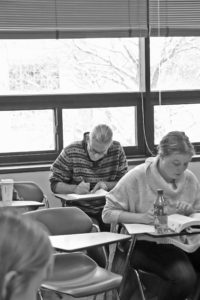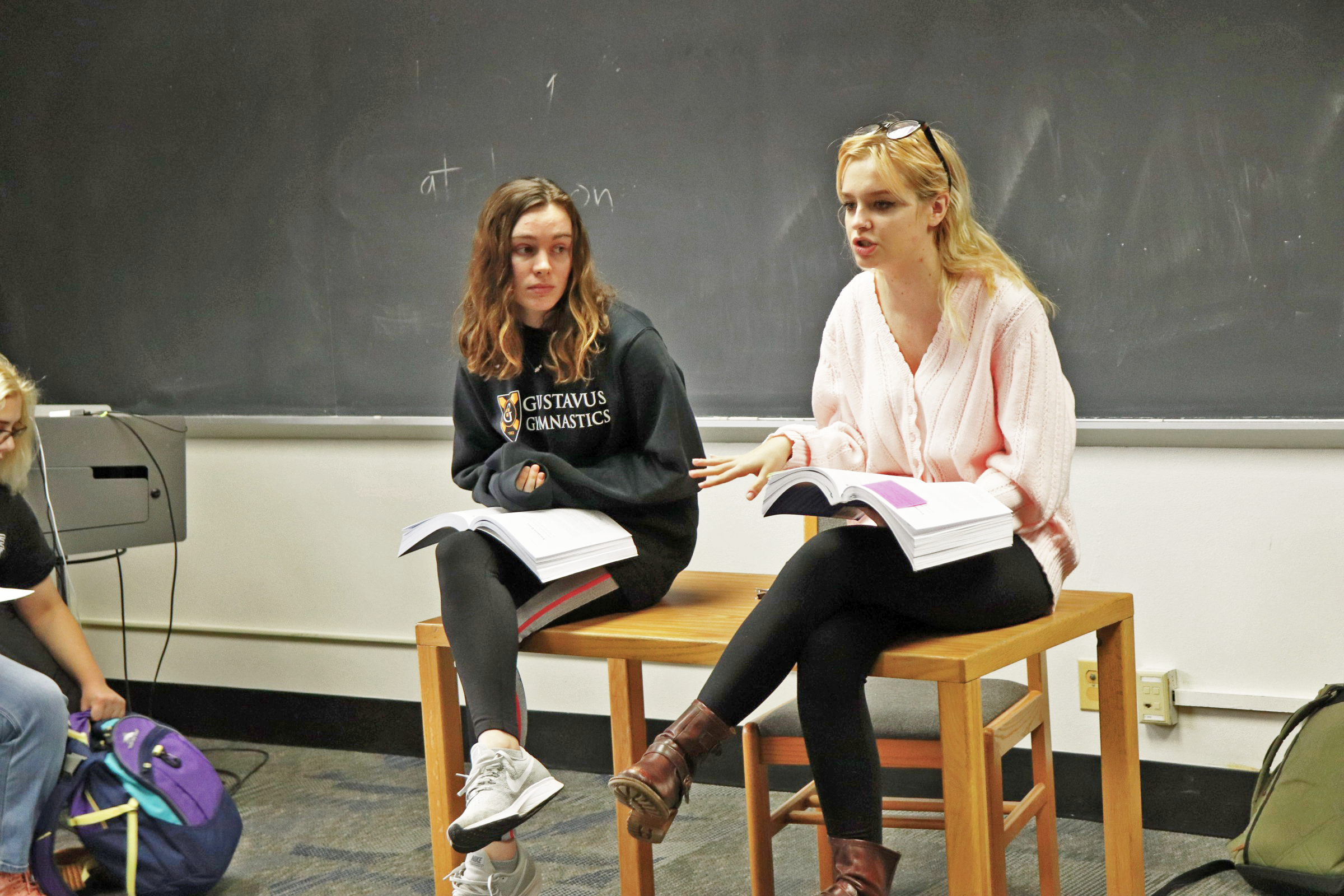The conversation surrounding diversity at Gustavus has continued this week after anonymous students from an English class on Queer Theory hung posters around campus questioning the way that the Gustavus administration handles diversity. It should be known that I am a student in the Queer Theory class, but was not involved with the creation or posting of the posters in question.
One of the poster creators agreed to speak with the [Weekly], but their identity will remain anonymous for the sole purpose of protection against biast attacks of any type, as well as the individuals future involvement on campus. The posters came out as part of a midterm assignment for the English Queer Theory class.
“In my classes we have been talking a lot about diversity and inclusion with the changing of the name of the Diversity Center to the Center for Inclusive Excellence,”the student source said.
After reading some of the theorists in the class, students began to equate what they were learning with their experience at Gustavus.
“If we have to do diversity work, it just shows that the institution is not diverse, which is something we learned from Sara Ahmed,” the student source said.
The posters were created to “spark a conversation” and to focus on specific issues surrounding diversity at Gustavus. The hope was to bring this conversation to the campus at large.
“We did not plan to post the posters on Give to Gustavus Day. It was a coincidence, but it was a great time to start the conversation with a lot of Gustie pride flowing… I love being here, but it is not the best, it’s not the worst, but there are things we need to fix. I’m glad people are talking. I’m glad the students are talking, whether they agree or disagree. I don’t want people to attack each other, I want people to have safe conversations,” the student source said.
The student had both a message for their peers and for the administration.
“To my peers, I just want them to realize that even if you personally feel included, there are those on campus who don’t feel included. I want people to start having the discussion about how my privilege is hurting others and how we can work together to make classrooms and halls feel more safe and inclusive.”
The student also had a message for the administration.
“To the administration, I want them to know students here, even if they have issues, a lot of us care a lot about the school. Gustavus does have a unique community, but when half the community doesn’t feel welcome here, something obviously needs to be done. There are a lot of students who would be willing to talk to the administration. The administration needs to know that what they think we want to happen in the school many not be what we actually want. While academics are important, I think the college should value inclusiveness and our mental and social wellbeing as well”.
“The administration needs to make a bigger push to meet us. Right now the students are doing 75 percent to 85 percent of the work, it’s not that administration isn’t doing anything, but they can help us even more.”
The student expressed they hope that the conversation about diversity can continue on campus. The student said that they would like to see students and the administration sit down together and discuss resource allocation for diversity work.
“We have people doing the work, but we may not have the funding or resources to actually implement things.”

Professor Robert Kendrick, Assoicate professor in the English department, is teaching the Queer Theory class this semester.
“My classes are learning collective which I facilitate, so that students, all of them, are expected to share their ideas supported by evidence. My primary Student Learning Objective in every class is for students to find their own voices and positions on the topics of the course and how they relate to the world beyond the classroom,” Kendrick said.
“[The class] draws together multiple interventions in queer issues from widely divergent perspectives,” Kendrick said.
This structure is intended to offer points of access for every student in the class, so that we each find those ideas that resonate with our own experiences as well as those ideas that make us reassess how we view the world and our place in it,” Kendrick said.
Students in the class have been influenced by one theorist in particular.
“Sara Ahmed’s Living a Feminist Life had been one of the most provocative and influential works in our class. Ahmed’s analysis of the frustrations she experienced with her university’s diversity initiatives led us to think about what diversity is at [Gustavus] and to envision what we want it to be,” Kendrick said.
Many members of the campus community would like to know how the college has worked to foster a climate of diversity and inclusion in the past and how they will continue to advance the mission of inclusion here at Gustavus.
Chaplin of the college and chair of the President’s Council for Diversity, Equity, and Inclusion, Siri Erickson shared some of the ways the college is working to create a climate of inclusion on campus.
“The first thing I would emphasize is that we have a college president who is 100 percent committed to advancing diversity, equity, and inclusion at Gustavus. Her support and leadership is essential for the work that people across campus are doing to create a more inclusive and equitable campus,” Erickson said.
During President Bergman’s incumbency, Gustavus has increased the number of scholarships for students from historically underrepresented groups to make a Gustavus, education more accessible and affordable for everyone. Once students are here at Gustavus there are programs to support them during their time here.
“Our Center for Inclusive Excellence does a wonderful job supporting students from historically underrepresented groups and advocating for any student or groups of students who are not feeling fully included at Gustavus,” Erickson said.
There are also student led groups that work to foster diversity at Gustavus.
“The student-led Diversity Leadership Councils and Multifaith Leadership Councils do excellent work in bringing awareness to the whole campus about the rich diversity of cultures, religions, perspectives, and identities represented at Gustavus, advocating for the dignity of all people on campus, and educating the campus about diversity, inclusion, and interfaith efforts,” Erickson said.
While Gustavus has done work to make our campus more inclusive, the administration recognizes that more work still needs to be done.
“As the Gustavus student body has become more diverse, it has become clear that there has not been an equivalent change in the diversity of the College’s employees. We know our educational environment would be more inclusive if students from diverse backgrounds had access to role models, mentors, professors, and leaders who shared their identities,” Erickson said.
Gustavus is working to develop and implement a more inclusive and equitable hiring process that will diversify our faculty and staff.
“In addition, we live in a society that is wrestling with the legacy and impact of pernicious and persistent forms of discrimination, harrassment, and violence against specific groups of people based on their identities. We have all been impacted by these -isms and therefore hold implicit biases of various kinds. The white majority on campus has a particular responsibility to better understand the impact of white identity and privilege on our campus and in society. This is an area where we still have a lot of work to do to root out bias, to learn to speak openly about the complex intersections of identity and privilege and how they impact our relationships with each other, and to challenge ourselves to change our systems and structures to be more just and equitable,” Erickson said.
The President’s Council for Diversity, Equity, and Inclusion, is a group of faculty, staff, and students who are working on strategic institutional projects that advance inclusive excellence, intercultural development, and equity at Gustavus.
“We are currently rolling out a new plan to engage faculty and staff in training and development related to diversity, equity, and inclusion. The President’s cabinet is leading the way on this work through a tool called the Intercultural Development Inventory (IDI) as a way to engage in their own learning, self-reflection, and intercultural development,” Erickson said.
Gustavus has set the goal that 25 percent of Gustavus employees will participate in development in these areas this year. In the future, the goal is to make this training available to all employees. More information about the President’s Council for Diversity, Equity, and Inclusion can be found on the Gustavus Website at https://gustavus.edu/president/pcdei/.
“I invite students who have concerns or ideas related to diversity, equity, and inclusion to communicate with me; student perspectives and insights are very important to me, to President Bergman, and to the councils, committees, and teams that are working on these efforts across campus. Working together, we can create a more inclusive and equitable Gustavus,” Erickson said.
President Bergman also commented on diversity at Gustavus.
“I am fiercely passionate about diversity, equity, and inclusion and I have been for my entire career…For me it’s important that we take a comprehensive and institutional approach to this. It is not a short term initiative we have to be in this for the long hall” said President Bergman.
“There are two things I strongly believe in. Number one, the person at the top of the organization has to be the chief champion and cheerleader and advocate for the topic, and number two this has to be across the institution which is why the presidents council is at the institutional level so it has representatives from all constituencies of the college” President Bergman said.
As the campus moves forward in the conversation surrounding diversity at Gustavus we all have a role and responsibility to do the work to create an environment of inclusion.
Editor’s note:
In our last issue of the Gustavian Weekly, the front page article “Controversial diversity posters pop up around campus” stated that the Center for Inclusive Excellence (CIE) did not respond to an invitation to comment.
This is untrue, and the Gustavian Weekly apologizes for the error in communication. The CIE has made clear that their office values the opportunity to contribute and help lead the campus conversation surrounding diversity and inclusivity. The Weekly wishes to thank the CIE for their continued work on campus, especially its effort to make our campus a place for every individual. Our specific language within this article has portrayed the CIE in a poor light–this was not our intent, but may have been the impact.
